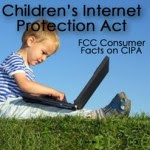Now there is a model for a more effective means to protect children, thanks to concerned parents in Manitou Springs, Colorado. They worked with the Colorado legislature to tighten school technology laws to require schools to address technology concerns everywhere, not just on school grounds. Similar changes can be made in the laws of other states so more children are better protected from harm.
Children’s Internet Protection Act
School Grounds Only Expedient Position and Resultant Harm
Kids around the nation have already suffered in districts that fail to provide CIPA protections on portable computers away from school:
- Parents in South Carolina report students with unfiltered school portables experiencing “a veritable streaming torrent of illicit flesh….“ using school supplied iPads. (N2)
- Four Michigan students were arrested on felony charges for exchanging pornographic materials on iPads and leaving parents to ask “Why wasn’t the school district filtering Internet to student’s iPads?” (N3)
- Parents in Indiana are suing their district for allowing students “unfettered access to pornographic videos… downloaded on school computers and iPads and then 'acted out' on [an] alleged victim.” (N4)
Manitou Springs Parents Fight Back
Despite a petition from the parents and written opinions from two attorneys validating parental objections, the Manitou Springs school administration held firm, insisting that the school had no responsibility for protecting student use of portable devices away from school grounds. (N6)
Colorado Legislature Intervenes; Requires Filtering Everywhere, Not Just School Grounds
"No later than December 31, 2012, the governing body of each district shall adopt and implement a policy of internet safety for minors that includes a technology protection measure for each technology device provided by the district that allows for access to the internet by a minor from any location.” (N7)
With this 2012 legislation, Colorado became the first state to create law that explicitly requires that the protections required by CIPA must also protect students using school issued computers that are now increasingly portable and capable of accessing Internet networks from any location, not just at school. And the parents love it: “No law will completely shield our kids from all the bad stuff, but I was glad to see Colorado lawmakers side with parents and make it clear that if a school sends kids home with computers, they must make them reasonably safe for the kids to use,” says Manitou Springs parent/guardian Jim Sayner. (N8)
Legislators and Schools Everywhere May Protect Children Using the Colorado Model
At least now, the parents of Colorado children who experience such illicit mayhem on inadequately protected portables will have substantial new recourse under this new and timely law.
ENDNOTES:
(N1) “Children’s Internet Protection Act,” by Consumer & Governmental Affairs, Federal Communications Commission, 19 May 2011.
http://www.fcc.gov/guides/childrens-internet-protection-act
See also:
United States v. American Library Association, 539 US 194 (2003).
http://laws.findlaw.com/us/539/194.html
(N2) “SC Public School Students Accessing Porn On iPads,” by fitsnews, FITSNews, 7 February 2012.
http://tinyurl.com/StudentsAccessingPornOnIPads
Note: NSFW pornographic image is included in original version.
(N3) “Zeeland Schools Learn From iPad Miscues; Administrators Have More Plans in Place,” by Dani Carlson, WOOD TV8, 22 August 2012.
http://www.woodtv.com/dpp/news/education/Zeeland-schools-learn-from-iPad-miscues
(N4) “Three Second-Grade Boys Accused of ‘Horrific Sexual Abuse’ of Eight-Year-Old Classmate ‘After Acting Out Scene They Saw in Porn Movie,’” by Daily Mail Reporter, Daily Mail, 2 October 2012.
http://www.dailymail.co.uk/news/article-2211964/Three-second-grade-boys-accused-horrific-sexual-abuse-year-old-classmate-school-blamed-giving-students-unfettered-access-porn.html
(N5) “Digital Dilemma: Why Can’t All Districts Filter Internet Device Access from Home?,” by Eddie, Ed Is Watching, 20 February 2012.
http://www.ediswatching.org/2012/02/digital-dilemma-why-cant-all-districts-filter-internet-device-access-from-home/
Note:
Colorado also has its own CIPA law (CCIPA) (see N7 below)—it was CCIPA that was amended as a result of parental action.
(N6) “School Issued Apple iPads Allow Porn in Manitou Springs School District 14, Memorandum by Morality in Media General Counsel Robert Peters on Unfiltered Internet Access,” by Robert W. Peters, Esq., SafeLibraries, 27 April 2012.
http://safelibraries.blogspot.com/2012/04/school-issued-apple-ipads-allow-porn-in.html
(N7) “An Act; House Bill 12-1240, Concerning Statutory Changes to K-12 Education,” by various Representatives and Senators, Colorado Legislature, signed into law 4 June 2012; section 54, pp36-38.
http://www.leg.state.co.us/clics/clics2012a/csl.nsf/fsbillcont3/A386D89EDA600136872579820026D8D7?open&file=1240_enr.pdf
Note:
For comparison, here is the older 2003 version of the Colorado Children’s Internet Protection Act the was amended as described above:
“Colorado Children’s Internet Protection Act,” Colorado Revised Statutes, Article 87, 22-87-101 through 22-87-107; Approved by Governor June 5, 2003; effective August 15, 2003.
http://www2.bvsd.org/iteach/IAC%20Documents/Colorado%20Internet%20Protection%20Act.pdf
See also:
“State Filtering/Blocking Laws” section of “Children and the Internet; Laws Relating to Filtering, Blocking and Usage Policies in Schools and Libraries,” by Pam Greenberg, National Conference of State Legislatures, 13 February 2012 (updated occasionally).
http://www.ncsl.org/issues-research/telecom/state-internet-filtering-laws.aspx#states
Note: Colorado’s information has not yet been updated at that site.
(N8) Personal communication with Jim Sayner.
URL OF THIS PAGE:
For convenience, here are easy-to-remember URLs for this page:
CITE AS:
“School Districts Must Filter School-Supplied iPads; Internet Safety Law Now Extends Filtering Beyond School Grounds, Thanks to Parents in Manitou Springs, Colorado,” by Dan Kleinman, SafeLibraries, 20 December 2012.
Follow @SafeLibraries


